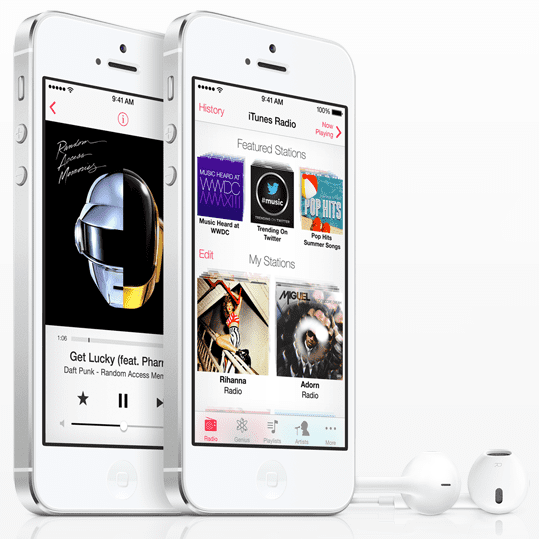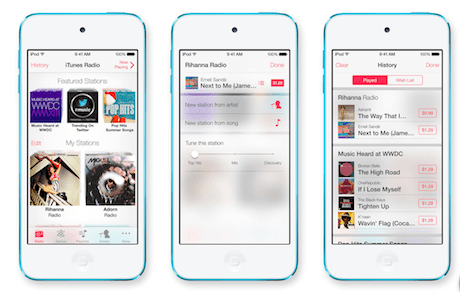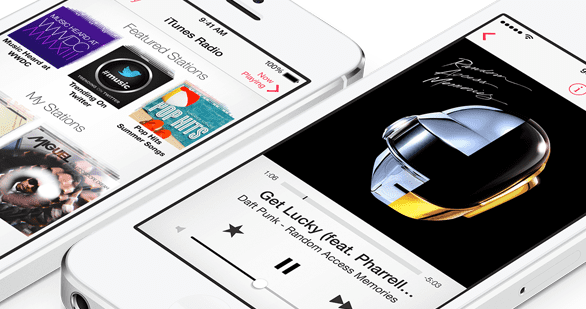Apple finally announces its own streaming service, with major implications for the rest of the music industry.
 As Apple’s Worldwide Developers Conference draws to a close for another year, the distinct absence of Logic news has left everyone guessing again, but there was no mystery around another of the company’s revelations: iTunes Radio, Apple’s long-anticipated music streaming service has been one of the worst kept secrets in the music business. The only big surprise is that we all thought it’d be called iRadio.
As Apple’s Worldwide Developers Conference draws to a close for another year, the distinct absence of Logic news has left everyone guessing again, but there was no mystery around another of the company’s revelations: iTunes Radio, Apple’s long-anticipated music streaming service has been one of the worst kept secrets in the music business. The only big surprise is that we all thought it’d be called iRadio.
Apple’s move to boldly go where everyone else has gone before looks like it’ll focus on powerful data algorithms, a drive towards music purchases and snug integration with Apple devices.
Apple has access to data from 575 million iTunes users, detailing their listening and purchasing habits. Gleaning from that data, the discovery element of iTunes Radio, based on their existing Genius service, will produce (relatively) accurate music recommendations.
Genius can’t come close to the finesse of Pandora’s renowned ‘Music Genome Project‘, whereby each song is filtered through human ears to be tagged according to sounds, styles, genres, and even historical context, but Apple has the advantage of drawing from a catalogue of 26 million songs, dwarfing Pandora’s 900,000. And while Pandora’s focus is the discovery of undiscovered music, iTunes Radio offers a toggle which can be used to switch between ‘Top Hits’, ‘Discovery’ or ‘Mix’ when listening. In this way they cater for the more varied listening motivations of a larger user base, while also making their vast catalogue slightly easier to navigate.
Apple is clearly pitching to the mass market. While streaming services such as Spotify are in the business of selling ads and subscriptions, iTunes Radio focuses on selling music – as much of it as possible, and to as many people as possible. Apple’s access to most of iTunes users’ credit card details makes the music-buying process seamless; the one-click buy button displayed on each track no doubt put Apple in a good position for negotiations with the majors. It will be interesting to see what deals have been struck, and whether Apple will attempt to make similar arrangements with independents. Given the ongoing debates over artist and label royalties from streaming, iTunes Radio could well be the ideal half-way house: a convenient streaming service which also encourages users to make impulse buys, thus bumping up label and artist revenue.
 iTunes may be in the business of selling music but Apple, lest we forget, is in the business of selling devices. Thus, another notable feature of iTunes Radio is the seamless integration with Apple’s hardware product range (and also with the iCloud subscription service). iTunes Radio will be embedded into Apple’s new iOS 7 mobile operating system, built in to iTunes for Mac and Windows, and accessible through Apple TV. The free version will be ad-supported or, alternatively, users can opt for ad-free by subscribing to iTunes Match. As with Google Music, you can upload your own library and iTunes will ‘Match’ it to the equivalent tracks in their catalogue which you can access at any time, on any device, via the cloud.
iTunes may be in the business of selling music but Apple, lest we forget, is in the business of selling devices. Thus, another notable feature of iTunes Radio is the seamless integration with Apple’s hardware product range (and also with the iCloud subscription service). iTunes Radio will be embedded into Apple’s new iOS 7 mobile operating system, built in to iTunes for Mac and Windows, and accessible through Apple TV. The free version will be ad-supported or, alternatively, users can opt for ad-free by subscribing to iTunes Match. As with Google Music, you can upload your own library and iTunes will ‘Match’ it to the equivalent tracks in their catalogue which you can access at any time, on any device, via the cloud.
While iTunes Radio and Google Music Play All Access do share a few key features, it’s not Google who needs to be worried. Apple has opted for the internet radio model (Pandora) rather than an on-demand catalogue service (Google, Spotify) – presumably to encourage sales of a wider pool of tracks and please the majors. However, while Pandora pays a standard internet radio royalty fee and is therefore bound by the corresponding laws (no rewind, no repeat, limited skips), Apple’s individual deals with the majors mean iTunes Radio is likely to escape some of those limitations.
Is Pandora panicking? When news of iTunes Radio hit, Pandora’s share price rose and CEO Joe Kennedy quickly issued a statement suggesting he was unfazed (“Apple’s new feature is an evolution of their iTunes offering to bring it on par with other streaming music services… We have spent the last 13 years singularly focused on redefining radio and benefit from unrivaled intellectual property, deep experience in delivering personalized playlists, and ubiquitous product availability across every platform”). But two days later, Pandora have snapped up an FM radio station in order to join the Radio Music Licensing Committee so they can have more negotiating power over royalty fees and potentially benefit from lower rates. Maybe not so unfazed after all?
Is this the moment when streaming services finally become mainstream? Let us know your thoughts.
